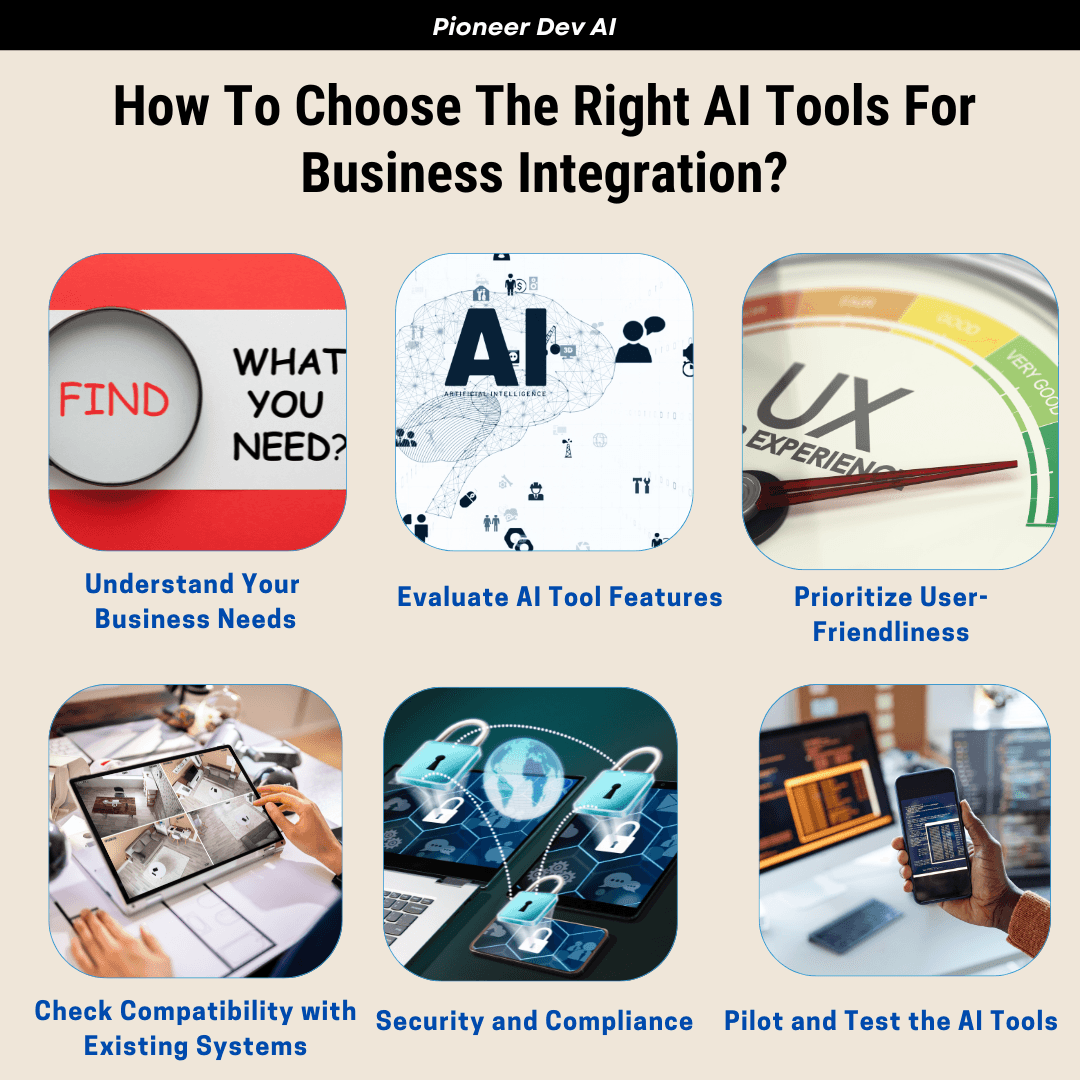How To Choose The Right AI Tools For Business Integration
From automating routine tasks to enhancing customer experiences , AI tools for business are transforming the way companies operate, regardless of industry.
AI integration refers to embedding AI technologies directly into core business processes, enabling automation and intelligent insights that help teams work smarter and faster.
Whether it’s optimizing customer service with AI-powered chatbots or improving product recommendations, integrating AI tools into your business strategy is essential for long-term success.
This article is here to guide you through the process of selecting the best AI tools for business integration. From understanding your business needs to evaluating tools that align with your goals, we’ll walk you through key factors to consider, helping you make informed choices that maximize AI’s potential within your organization.

Understand Your Business Needs
When choosing the right AI tools for business integration, it’s essential to begin with a solid understanding of your specific needs and goals. By thoughtfully assessing where AI can add value, companies—especially small businesses—can ensure that their AI investments align with core objectives and drive meaningful outcomes.
Assess Your Business Processes
The first step in successful AI integration is identifying which processes could benefit most from it. For instance, AI solutions for small businesses, like customer service chatbots, can provide 24/7 support, reducing customer wait times and improving satisfaction.
According to research by Juniper, businesses could save up to $8 billion annually by using chatbots for customer support by 2026. Additionally, AI-driven data analysis tools can help uncover valuable trends in customer behavior, giving small businesses insights to better tailor their products or services.
Define Specific Objectives
With a clearer understanding of potential areas for improvement, the next step is to outline specific objectives. Ask yourself what problems AI solutions will help you solve—are you aiming to increase efficiency, reduce operational costs, or enhance customer satisfaction?
For example, small businesses looking to streamline tasks might benefit from AI automation tools that handle repetitive work, freeing up time for employees to focus on complex, high-value activities.
Scalability and Growth
Consider your business’s future needs when evaluating AI solutions for small businesses. As your business grows, you’ll want AI tools that can scale with it.
Cloud-based AI solutions, such as those provided by Amazon Web Services or Microsoft Azure, are designed to support growth, allowing you to expand capabilities without overhauling your existing setup. This scalability ensures that your AI investments continue to support and propel your business forward, even as your needs evolve.
Prioritize User-Friendliness
When selecting AI tools for business, prioritizing user-friendliness is crucial to ensure smooth integration and long-term success. Even the most advanced AI solutions can fall short if they are difficult to implement or if your team struggles to adapt to them.
By choosing tools that are easy to use and come with strong support, businesses can unlock the full potential of AI without added complexity.
Ease of Implementation
One of the biggest challenges for businesses, particularly small and medium-sized enterprises, is the implementation of new technology.
According to a report by McKinsey, nearly 70% of digital transformation projects fail , often due to challenges in adopting new systems. An ideal AI tool for business should be easy to deploy with minimal disruption, enabling a seamless transition without halting operations.
For example, many cloud-based AI solutions offer plug-and-play options that integrate quickly with existing software, reducing setup time and initial costs.
Training and Support
Adapting to AI often requires training, especially for businesses without in-house technical expertise. AI tools that offer accessible resources—such as tutorials, live training sessions, and reliable customer support—can help your team quickly become proficient and confident in using the technology.
According to a survey by Deloitte, 47% of business leaders report a lack of AI-specific training as a barrier to effective AI adoption. Choosing a tool with built-in support and accessible training materials can make a significant difference in the speed and effectiveness of your AI integration.
User Interface and Experience
A straightforward, intuitive user interface is key for widespread adoption across your team, particularly if your employees have limited technical backgrounds.
Many AI tools for business now focus on no-code or low-code platforms that allow users to harness the power of AI without needing programming skills.
Choosing an AI tool that prioritizes user-friendliness means your team can focus on driving results rather than struggling with complex technology. This approach not only accelerates productivity but also increases employee engagement, making the AI tool a valuable, accessible asset across the business.
Check Compatibility with Existing Systems
For successful AI integration, it’s essential to ensure that the AI tools you choose are compatible with your existing systems. Small businesses, in particular, benefit from AI solutions that integrate easily with their current tech stack, as this minimizes disruptions and optimizes workflow continuity.
By selecting tools that seamlessly work with existing software, you can maximize the value of AI without overhauling your entire system.
Evaluate System Compatibility
A critical first step in AI integration is assessing how well an AI tool will fit with your current systems, such as ERP (Enterprise Resource Planning) and CRM (Customer Relationship Management) platforms.
This is especially relevant for small businesses that rely on lean operations and need their systems to work in harmony to avoid bottlenecks.
APIs and Plug-ins
AI solutions for small businesses often come with APIs (Application Programming Interfaces) and plug-ins that enable easy integration with other software. These features allow AI tools to pull and share data with your existing systems, which enhances functionality without requiring extensive reconfiguration.
Data Migration
When implementing a new AI solution, consider how easily you can migrate existing data into the AI system. Smooth data migration is critical for avoiding data loss or inconsistencies, which can impact both short-term and long-term business performance.
Choosing AI tools designed with robust data migration capabilities helps prevent data-related issues and ensures that you start using the AI system with all necessary historical data intact.
Security and Compliance
When integrating AI solutions for small businesses, security and regulatory compliance are critical factors to consider. Effective AI integration not only enhances operations but also safeguards sensitive data and aligns with industry-specific regulations.
Data Protection
Choosing AI tools that adhere to data privacy regulations—such as GDPR in Europe or HIPAA in healthcare—is essential for ensuring legal compliance. These regulations enforce standards for how customer data is collected, stored, and used, and non-compliance can lead to hefty fines.
According to IBM’s Cost of a Data Breach Report , data breaches cost companies an average of $4.88 million in 2024, a cost that is often devastating for small businesses. To prevent such risks, prioritize AI solutions that include strong data protection features, such as access control and regular auditing.
Cybersecurity Features
Cybersecurity is a must for any AI tool, as many cyberattacks specifically target smaller businesses. AI solutions with security measures such as encryption, data anonymization, and multi-factor authentication can prevent unauthorized access and protect against data theft.
Compliance with Regulations
Beyond data privacy, businesses also need to ensure AI solutions comply with industry-specific regulations. For example, financial institutions must follow anti-money laundering (AML) laws, and healthcare providers must adhere to HIPAA requirements.
Using AI tools that are built with regulatory compliance in mind can streamline processes and reduce the risk of legal issues.
By focusing on security and compliance, small businesses can confidently integrate AI solutions, enhancing operational efficiency while safeguarding customer data and meeting all regulatory requirements.
Pilot and Test the AI Tools
Before committing to a full-scale AI integration, running a pilot program allows you to assess the AI tools for business within a controlled scope. Start with a small, manageable project that clearly demonstrates the tool’s value.
This initial phase will reveal how effectively the AI solution addresses your specific business needs and highlight any adjustments that may be necessary before a broader rollout.
Start with a Small Project
Testing an AI tool for business on a limited project helps validate its performance with minimal risk and disruption. For example, if the goal is to enhance customer service, consider piloting the tool with a single team or department. This approach minimizes risk and yields insights that guide a successful company-wide implementation.
Gather Feedback
During the pilot phase, gathering team feedback is essential, as employees interact with the AI tool in real business scenarios. Insights on ease of use, functionality, and any challenges can help refine the tool, ensuring that it aligns with user needs and company goals before scaling.
Analyze Performance
After the pilot, assess whether the AI solution meets your objectives and key performance indicators (KPIs). Track its impact on productivity, efficiency, or customer satisfaction, as this review provides data-driven insights to inform your decision on expanding the integration.
Conclusion
Choosing the right AI tools for business is a strategic investment that can transform your operations, boost productivity, and support long-term growth. From understanding your business needs and ensuring system compatibility to prioritizing security and testing solutions through pilot programs, each step is crucial to setting up a successful AI integration.
At Pioneer Dev AI , we specialize in tailored AI solutions that cater to businesses of all sizes, providing the expertise and support needed to ensure seamless AI integration and measurable results. Take the next step confidently with an AI partner committed to helping you unlock your business’s potential.

